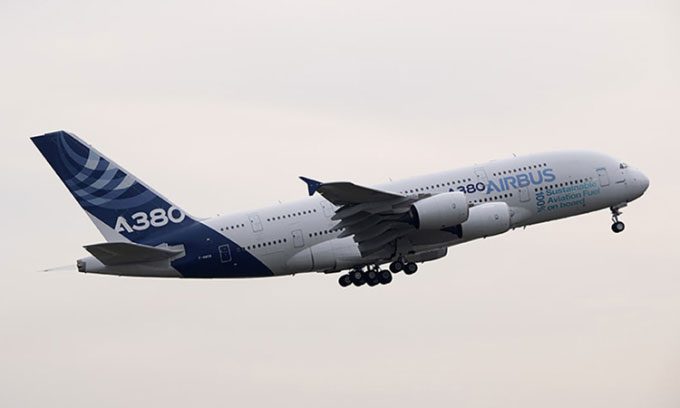Airbus A380 Completes Test Flight in France Using 100% Sustainable Fuel Made from Cooking Oil and Waste Fat.
The massive Airbus A380 successfully completed a special test flight lasting 3 hours, departing from Blagnac Airport in Toulouse, France, on March 25. The flight utilized Rolls-Royce Trent 900 engines and Sustainable Aviation Fuel (SAF) primarily made from used cooking oil and waste fat.

Airbus A380, the world’s largest passenger aircraft. (Photo: Airbus)
Airbus subsequently conducted a second A380 flight using the same type of cooking oil fuel, flying from Toulouse to Nice on March 29. The second flight aimed to monitor the use of SAF during takeoff and landing.
The fuel used by the A380 was supplied by TotalEnergies, a company based in Normandy, France. Airbus has been testing flights powered by SAF since last year, with the A350 conducting a test flight in March 2021 and the A319 flying on cooking oil in October. The company hopes to receive approval for aircraft to fly on SAF by the end of this decade. Currently, Airbus aircraft can operate with 50% SAF mixed with traditional kerosene.
“Increasing the use of SAF is a key measure to achieve the aviation industry’s net-zero carbon emissions ambition by 2050,” Airbus stated. The company asserts that using SAF for aircraft can help reduce carbon emissions by 53% to 71%. Airbus plans to introduce the world’s first zero-emission aircraft to the market by 2035.
SAF is considered carbon-neutral (the amount of carbon emitted equals the amount absorbed). Some airlines have used this fuel in limited quantities. However, the high cost makes widespread adoption unlikely in the near future.
As the largest passenger aircraft in the world, the reputation of the A380 has diminished in recent years due to several airlines ceasing operations, partly because they are less fuel-efficient compared to modern long-range aircraft. Airbus delivered the last A380 to Emirates airline at the end of 2021.
On February 22, Airbus announced plans to use this giant aircraft to test hydrogen engines—a development aimed at reducing environmental impact during flights.





















































